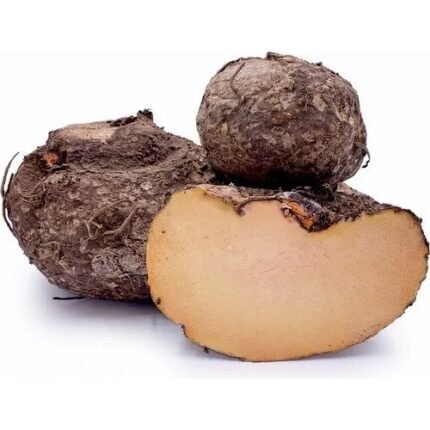Medically reviewed by Dr. Ramesh Gaddam, M.D. — Written by Sumalatha, D.N.H.E
Table of Contents
ToggleElephant Foot Yam (Suran), scientifically known as Amorphophallus paeoniifolius, is a tropical tuber native to Southeast Asia.
It is widely cultivated for its starchy corm, which is used in various culinary and medicinal applications.
Rich in fiber, vitamins, and antioxidants, this tuber is known for its potential health benefits, including improved digestion, weight management, and anti-inflammatory properties.
Commonly referred to as Suran or Jimikand, it also plays a role in traditional medicine for its purported therapeutic effects
1. Nutrition
Nutrition of Elephant Foot Yam per 100 grams:
| Nutrient | Amount |
|---|---|
| Calories | 81 kcal |
| Carbohydrates | 18.4 g |
| Protein | 1.5 g |
| Fat | 0.2 g |
| Dietary Fiber | 5.1 g |
| Vitamin C | 7 mg |
| Vitamin B6 | 0.3 mg |
| Potassium | 816 mg |
| Calcium | 50 mg |
| Magnesium | 33 mg |
| Phosphorus | 56 mg |
| Iron | 0.6 mg |
| Sodium | 6 mg |
2. Health Benefits

Elephant Foot Yam, or Amorphophallus paeoniifolius, offers several health benefits due to its rich nutrient profile:
Digestive Health:
High in dietary fiber, Elephant Foot Yam aids digestion, prevents constipation, and promotes regular bowel movements.
Weight Management:
Low in calories and high in fiber, it helps in weight management by promoting satiety and reducing overall calorie intake.
Anti-inflammatory Properties:
The tuber contains compounds with anti-inflammatory effects, which can help reduce inflammation and pain associated with conditions like arthritis.
Antioxidant Effects:
Rich in antioxidants, Elephant Foot Yam helps neutralize free radicals, reducing oxidative stress and the risk of chronic diseases.
Blood Sugar Regulation:
Its low glycemic index and fiber content help in managing blood sugar levels, making it beneficial for diabetics.
Cardiovascular Health:
The tuber is known to help in reducing cholesterol levels and improving heart health due to its fiber and antioxidant content.
Immune System Support:
Vitamins and minerals in Elephant Foot Yam, such as vitamin C and zinc, support the immune system, enhancing the body’s ability to fight infections.
Hormonal Balance:
In traditional medicine, it is used to support hormonal balance and alleviate symptoms of menopause.
Overall, incorporating Elephant Foot Yam into the diet can contribute to various aspects of health, from improving digestion to supporting immune function.
3. Uses

Elephant Foot Yam, also known as Suran or Jimikand, has various uses in culinary, medicinal, and agricultural contexts:
Culinary Uses:
Vegetable Dishes:
Elephant Foot Yam is commonly cooked as a vegetable in curries, stews, and stir-fries. It is often used in traditional recipes in Indian and Southeast Asian cuisines.
Snacks and Appetizers:
The yam can be sliced and fried to make chips or fritters. It is also used in making savory snacks.
Pickles and Ferments:
In some cultures, it is pickled or fermented to enhance its flavor and shelf-life.
Mashed and Baked Dishes:
Similar to potatoes, it can be mashed or baked as a side dish.
Medicinal Uses
Digestive Aid:
Traditionally used to treat digestive issues such as constipation and irritable bowel syndrome due to its high fiber content.
Anti-inflammatory:
Applied as a poultice to reduce inflammation and pain in joints.
Hormonal Balance:
Used in traditional medicine to alleviate symptoms of menopause and manage hormonal imbalances.
Weight Management:
Its low-calorie, high-fiber nature makes it suitable for weight management diets.
Agricultural Uses
Animal Feed:
The leaves and peels of the yam plant are sometimes used as feed for livestock.
Crop Rotation:
It is used in crop rotation to improve soil fertility and manage pest populations due to its unique growing properties.
Other Uses
Natural Dye:
The yam can be processed to extract natural dyes used in textile and craft industries.
Bio-degradable Products:
Research is being conducted on using yam starch to produce biodegradable plastics and other eco-friendly materials.
These diverse uses make Elephant Foot Yam a valuable and versatile plant in various cultures and industries.
4. Side Effects
Elephant Foot Yam (Amorphophallus paeoniifolius) can have several side effects, especially if not prepared or consumed properly:
Allergic Reactions:
Some individuals may experience allergic reactions, such as itching, rashes, or swelling, particularly if they are sensitive to the compounds in the yam.
Oxalate Content:
Elephant Foot Yam contains oxalates, which can contribute to the formation of kidney stones in susceptible individuals.
Consuming it in large quantities or without proper cooking methods may increase the risk.
Gastrointestinal Issues:
If not cooked thoroughly, it can cause gastrointestinal discomfort, including bloating, gas, and stomach pain due to its fibrous nature.
Toxin Content:
Raw Elephant Foot Yam contains certain toxins that can cause throat irritation, a burning sensation, or nausea.
Proper cooking methods, such as boiling or steaming, are necessary to eliminate these toxins.
Hormonal Effects:
In traditional medicine, it is sometimes used for its potential hormonal effects.
However, improper use or overconsumption can lead to hormonal imbalances or adverse effects in sensitive individuals.
Interaction with Medications:
It may interact with certain medications, particularly those related to hormone therapy or blood pressure regulation.
Consulting with a healthcare provider before incorporating it into the diet is advisable for those on medication.
Recommendations
- Proper Preparation: Always cook Elephant Foot Yam thoroughly to reduce the risk of toxins and gastrointestinal discomfort.
- Moderation: Consume in moderation, particularly if you have a history of kidney stones or digestive issues.
- Consultation: Seek medical advice if you have underlying health conditions or are on medication to avoid potential interactions.
These side effects highlight the importance of proper preparation and mindful consumption of Elephant Foot Yam to enjoy its health benefits safely.
5. Benefits for Skin

Elephant Foot Yam, or Amorphophallus paeoniifolius, offers several benefits for skin health due to its rich nutrient content and natural compounds:
Anti-inflammatory Properties:
The yam contains anti-inflammatory compounds that can help reduce skin inflammation and soothe irritated skin.
This is beneficial for conditions such as acne, eczema, and psoriasis.
Antioxidant Effects:
Rich in antioxidants like vitamin C, Elephant Foot Yam helps protect the skin from oxidative stress and damage caused by free radicals.
This can slow down the aging process and reduce the appearance of wrinkles and fine lines.
Moisturization:
The natural starches and fiber content in the yam help retain moisture in the skin, keeping it hydrated and preventing dryness.
This can result in smoother and softer skin.
Detoxification:
Consuming Elephant Foot Yam can aid in detoxifying the body, which indirectly benefits the skin by reducing the load of toxins that can lead to various skin problems such as blemishes and dullness.
Wound Healing:
The yam’s anti-inflammatory and antioxidant properties also contribute to faster healing of minor cuts, wounds, and burns.
Its natural compounds promote cell regeneration and repair.
Brightening:
The presence of vitamins and minerals in Elephant Foot Yam helps in brightening the skin tone and improving overall complexion.
Regular consumption can result in healthier and more radiant skin.
How to Use
- Topical Application: Create a paste from boiled and mashed yam and apply it as a face mask to reap its moisturizing and soothing benefits.
- Dietary Inclusion: Incorporate Elephant Foot Yam into your diet to benefit from its nutrients internally, which will reflect in healthier skin.
By integrating Elephant Foot Yam both topically and in your diet, you can enhance your skin health and achieve a more youthful, radiant appearance.
6. Is elephant yam good for uric acid?
Elephant Foot Yam may not be the best option for individuals with high uric acid levels or gout. Here’s why:
Oxalate Content:
Elephant Foot Yam contains oxalates, which can contribute to the formation of kidney stones.
High oxalate intake is also a concern for those with gout, as it can exacerbate the condition by increasing uric acid levels.
Purine Content:
While specific purine levels in Elephant Foot Yam are not well-documented, foods high in purines are generally avoided by those managing high uric acid levels, as purines are metabolized into uric acid in the body.
Recommendations
General Recommendations for Gout and Uric Acid Management
- Low-Purine Diet: Focus on foods low in purines, such as most vegetables, low-fat dairy products, and certain fruits.
- Hydration: Drink plenty of water to help flush uric acid from the body.
- Limit Certain Foods: Avoid red meat, organ meats, and certain seafoods high in purines. Also, limit alcohol, particularly beer.
Summary
While Elephant Foot Yam has health benefits, those with high uric acid levels or gout should consult a healthcare provider before adding it to their diet.
Personalized advice can address individual health needs and conditions.
7. Benefits for piles
Traditionally, Elephant Foot Yam has been used in some cultures for its potential health benefits, including for digestive issues like piles (hemorrhoids).
Here are some potential benefits of elephant foot yam for piles:
High in Fiber:
Elephant foot yam is rich in dietary fiber, which can help regulate bowel movements and soften stools.
This can be beneficial for reducing the discomfort associated with piles.
Anti-inflammatory Properties:
Some research suggests that elephant foot yam possesses anti-inflammatory properties.
Inflammation is a key component of hemorrhoids, so reducing inflammation may help alleviate symptoms.
Improves Digestive Health:
Consuming elephant foot yam can promote overall digestive health by supporting regular bowel movements and preventing constipation, which are important factors in managing piles.
Rich in Nutrients:
It contains various nutrients such as vitamins, minerals, and antioxidants, which can contribute to overall health and potentially support healing.
Traditional Use:
In Ayurveda and traditional medicine systems, elephant foot yam has been used for treating digestive disorders, including hemorrhoids, although scientific evidence specifically for this condition is limited.
Summary:
Elephant foot yam might help with piles based on traditional evidence, but more scientific studies are needed to be sure.
Before trying it, especially if you have health issues or take medications, talk to your doctor.
8. Is Elephant Yam Good for Weight Loss?
Elephant foot yam, also known as Amorphophallus paeoniifolius or Suran, is often considered beneficial for weight loss due to several reasons:
Low in Calories:
Elephant foot yam is relatively low in calories, making it a good choice for those looking to reduce calorie intake as part of a weight loss plan.
High in Fiber:
It is rich in dietary fiber, which helps promote feelings of fullness and satiety.
High-fiber foods can also aid in digestion and regulate bowel movements, which are beneficial for overall digestive health.
Low Glycemic Index:
Foods with a low glycemic index (GI) are digested more slowly, leading to gradual increases in blood sugar levels.
This can help in controlling appetite and reducing cravings for high-calorie foods.
Nutrient Density:
Elephant foot yam contains various vitamins, minerals, and antioxidants that support overall health.
When included in a balanced diet, it can contribute to meeting nutritional needs without adding excessive calories.
Potential Impact on Metabolism:
Some studies suggest that certain compounds found in elephant foot yam may have metabolic benefits.
Although more research is needed to confirm these effects specifically related to weight loss.
Summary:
Elephant foot yam can aid in weight loss due to its low calorie and high fiber content.
It should be part of a balanced diet that includes fruits, vegetables, lean proteins, and whole grains.
Regular physical activity is crucial for achieving and maintaining a healthy weight.
9. Precautions
When consuming elephant foot yam (Suran), it’s important to be aware of potential precautions and interactions, especially if you are taking medications.
Here are some key considerations:
Oxalate Content:
Elephant foot yam contains oxalates, which can contribute to kidney stone formation in susceptible individuals.
If you have a history of kidney stones or are prone to them, you may need to limit your intake of foods high in oxalates, including yams.
Allergic Reactions:
Some individuals may be allergic to elephant foot yam. Symptoms of an allergic reaction can include itching, swelling, hives, or difficulty breathing.
If you experience any allergic symptoms after consuming yam, seek medical attention immediately.
Digestive Issues:
The high fiber content in elephant foot yam may cause digestive discomfort such as bloating, gas, or diarrhea in some people, especially if consumed in large amounts or if your digestive system is sensitive.
Cooking:
Elephant foot yam should always be cooked thoroughly before consumption to neutralize any potentially harmful substances and to enhance its digestibility.
Raw or improperly cooked yam can cause irritation or discomfort in the mouth and throat due to the presence of calcium oxalate crystals.
10. Interactions with Other Drugs:
Elephant Foot yam may cause interaction with medications:
Blood Sugar Lowering Medications:
Elephant foot yam may lower blood sugar levels.
If you are taking medications for diabetes or insulin, consuming yam in large amounts could potentially enhance the effects of these medications, leading to hypoglycemia (low blood sugar).
Monitor your blood sugar levels closely if you consume yam regularly alongside diabetes medications.
Anticoagulant Medications:
Some studies suggest that yam may have anticoagulant properties, which could potentially interact with blood-thinning medications like warfarin (Coumadin), increasing the risk of bleeding.
If you are on anticoagulant therapy, consult your healthcare provider before adding yam to your diet.
Diuretic Medications:
Yam may have diuretic effects, meaning it could increase urine production.
If you are taking diuretic medications, consuming yam may enhance this effect, potentially leading to dehydration or electrolyte imbalances.
Monitor your fluid intake and consult with your doctor if you notice any changes in urine output or hydration status.
Frequently Asked Questions:
People searched frequently about Elephant Foot Yam are:
What is elephant foot yam good for?
Elephant foot yam, also known as Amorphophallus paeoniifolius or Suran, is good for various health benefits due to its nutritional profile.
It is rich in dietary fiber, vitamins, and minerals, which support digestive health, regulate bowel movements, and provide essential nutrients to the body.
Is elephant yam gastric?
Elephant yam may cause gastric discomfort in some individuals, especially if consumed in large quantities or if not cooked properly.
Its high fiber content can sometimes lead to bloating, gas, or indigestion.
How much sugar is in elephant yam?
Elephant yam contains natural sugars, but its glycemic index is relatively low compared to other starchy vegetables like potatoes.
Exact sugar content can vary, but cooking methods and portion sizes can influence its impact on blood sugar levels.
Can diabetics eat elephant yam?
Diabetics can consume elephant yam in moderation.
It has a low glycemic index and is high in fiber, which can help regulate blood sugar levels.
However, portion control and monitoring of blood glucose levels are recommended.
What are the health benefits of yams?
Yams offer several health benefits, including promoting digestive health, supporting weight management due to their high fiber content.
Provides essential vitamins and minerals, and potentially helps in blood sugar regulation.
Can I eat yams Everyday?
Yams can be eaten regularly as part of a balanced diet.
However, moderation is key, as excessive consumption may lead to digestive discomfort or unwanted changes in blood sugar levels.
Can a BP patient eat yam?
Yes, individuals with high blood pressure (hypertension) can eat yam as part of a healthy diet.
Yams are low in sodium and high in potassium, which can help regulate blood pressure levels.
Does yam increase blood sugar?
Yam has a low to moderate glycemic index, meaning it does not significantly raise blood sugar levels compared to high-GI foods.
However, portion size and cooking methods can affect its impact on blood glucose levels.
Who should not eat yam?
Individuals with a history of kidney stones or those prone to oxalate-related issues should limit their intake of yam due to its oxalate content.
Also, anyone allergic to yams should avoid them.
What is the side effect of yam?
Common side effects of yam consumption include digestive issues such as bloating, gas, or diarrhea, especially if eaten in large quantities or if not properly cooked.
What are the disadvantages of eating yam?
Disadvantages of eating yam may include its potential to cause gastric discomfort, its oxalate content which can contribute to kidney stone formation, and its impact on blood sugar levels if consumed in large amounts.
Which is better yam or potato?
Both yams and potatoes offer nutritional benefits.
Yams are generally lower in calories and have a lower glycemic index compared to potatoes.
Yams are also richer in fiber and certain vitamins and minerals.
Is yam bad for cholesterol?
Yam is not inherently bad for cholesterol. Its high fiber content may help in lowering LDL (bad) cholesterol levels when consumed as part of a balanced diet.
Is yam good for the liver?
Yam contains antioxidants and various nutrients that may support overall liver health.
However, specific benefits for the liver require more research.
Is yam bad for uric acid?
Yam is considered moderate in purines, substances that can contribute to uric acid formation.
People with gout or high uric acid levels should moderate their intake of yam.
References:
Also Read:
Honeydew Melon: Nutrition, Side Effects, (15 Super Benefits)
Medically reviewed by Dr. Ramesh Gaddam, M.D.

General Physician, Diabetologist, and Critical Care Specialist.
Related
Discover more from Health Build-Up
Subscribe to get the latest posts sent to your email.
